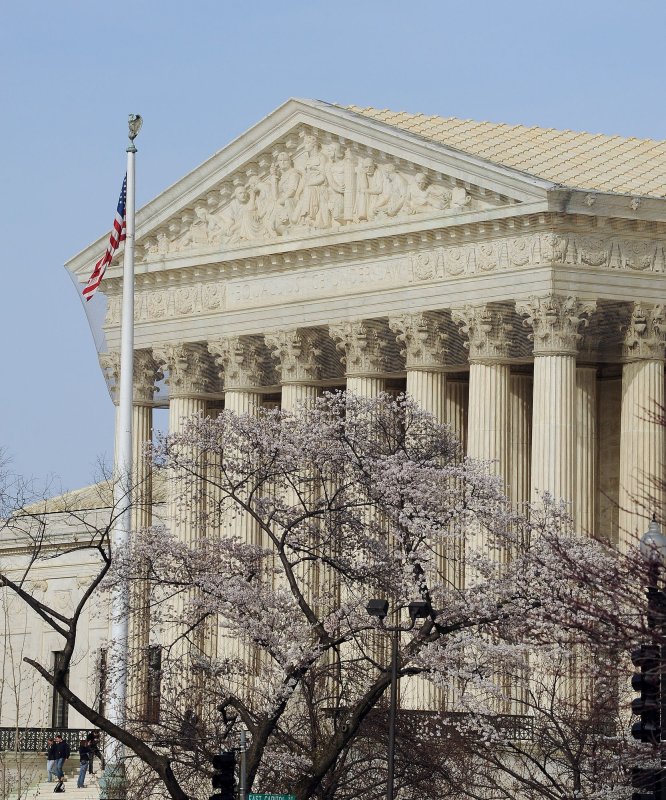The Supreme Court ruled Tuesday against a new sentencing hearing for death row inmate James McKinney. File Photo by Roger L. Wollenberg/UPI |
License Photo
Feb. 25 (UPI) -- The U.S. Supreme Court denied a new sentencing hearing Tuesday for an Arizona death row inmate whose lawyers say he suffered abuse and a jury, not a judge, should have sentenced him.
The newest Supreme Court Associate Justice Brett Kavanaugh, joined by four other conservatives, wrote the majority opinion. The decision was split 5-4 in a familiar pattern for death penalty cases, USA Today reported, as four liberal justices dissented.
At issue, was the case of James McKinney, who was sentenced to death by a Maricopa County Superior Court judge, along with his half brother, Charles Hedlund, for the murders of Christene Mertens, 41, and Jim McClain, 65, during a 1991 burglary spree around Phoenix, Arizona.
The 9th U.S. Circuit Court of Appeals held that the Arizona courts violated court precedent by failing to properly consider mitigating evidence, including McKinney's post-traumatic stress disorder from abuse.
The case returned to the Arizona Supreme Court. McKinney argued that he was entitled to a jury resentencing, but the court itself reweighed aggravating and mitigating evidence, including McKinney's PTSD, and upheld the death sentence in 2018.
Former acting U.S. Solicitor General Neal Katyal, representing McKinney, told the justices during oral argument in December that weighing aggravating and mitigating circumstances at the trial court level, not an appeals court, represents "the heart of what capital punishment sentencing is all about."
On the other hand, Arizona Attorney General Mark Brnovich had called the appeal "another attempt by a convicted killer to delay accepting responsibility for his heinous crimes."
"We must remember the victims and families," Brnovich said. "Justice delayed is justice denied."
Further complicating the case, a 2002 Supreme Court ruling in an Arizona case found that juries must weigh aggravating circumstances necessary for imposing the death penalty.
Associate Justice Ruth Bader Ginsburg said the 2002 ruling would not apply to the case on collateral review, but the case was a direct review, so it applied retroactively, making McKinney's death sentence "unconstitutional."
On the contrary, Kavanaugh argued that it was collateral review and the 2002 ruling did not apply retroactively.
"According to McKinney, appellate courts may no longer reweigh aggravating and mitigating circumstances in determining whether to uphold a death sentence," Kavanaugh wrote. "McKinney is incorrect."
A coalition of 15 states had urged the court not to grant the new sentencing hearing out of concern for how it may affect other death row inmates, including those in Alabama, Arkansas, Florida, Georgia, Idaho, Indiana, Kansas, Louisiana, Nebraska, Ohio, Oklahoma, South Carolina, South Dakota, Tennessee and Utah.
Steven J. Wells, a partner at Dorsey & Whitney law from, has been following the case closely, and made the following statement on the decision.
"This decision turns on a narrow procedural question: Whether a 'new' state supreme court review weighing aggravating and mitigating factors was a direct or collateral review of an earlier decision," Wells said in the statement. "But it highlights the fact that a death row defendant's life sometimes hangs on byzantine procedural nuances and the court's subjective characterization of proceedings in a state court."















